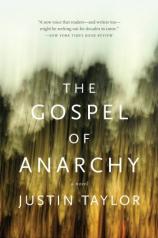The Gospel of Anarchy
Review
The Gospel of Anarchy
In the summer of 1999, a young man named David casts off his malaise and conformity for a life of abandon and faith after encountering a group of outliers in Gainesville, Florida. Before meeting the residents and hangers-on of a house dubbed Fishgut, David was mildly satisfied by his mindless work and Internet porn. But a chance encounter with a childhood friend in an alley one night brings David into a small community of youths who have pinned their hopes on the wisdom of a troubled man named Parker. In THE GOSPEL OF ANARCHY, Justin Taylor's debut novel, David and the other Fishgut residents explore faith and hope, community and relationships, all the while seeking a worldview that makes sense in a world that has disappointed them.
Shortly after reuniting with his old friend Thomas, now a dumpster-diving anarchist in the Gainesville punk scene, David moves in with him and two young women, Katy and Liz. The house is a rowdy place with drugs, cheap beer, loud music, political talk and casual sex. But roiling underneath the permissive and excessive party exterior of Fishgut are the quasi-religious ideas of a mysterious man named Parker. Parker had lived at Fishgut before David arrived, but his behavior had become increasingly strange and unpredictable. He moved out into a tent in the backyard and, after progressively longer stints away, disappeared forever. The longer he is gone, the greater Katy's fascination with him becomes until finally she is leading a group of cultish followers with Parker-centered rituals. After she, along with Thomas's girlfriend Anchor, finds one of Parker's strange and mystical journals buried under his abandoned tent, Katy's fervor takes on new intensity.
As Katy and David become increasingly wrapped up in Parker's message, Thomas, Anchor and Liz must take a hard look at their friends, their lifestyles and themselves. But because it is never quite clear what is driving them or what they are moving toward, the inner lives of these potentially fascinating characters is never fully brought to life in a sophisticated way. Taylor's premise --- the examination of idealism versus cynicism, materialism versus spirituality, youth in reflexive revolt versus youth engaged in reflective critical thinking --- is promising. However, he often falls into the same traps as his characters: a romance with language over idea and setting over substance. It's hard to know if David and Katy are delusional innocents or just a bit dumb. Thomas and Liz, who have real potential for growth as characters, are never asked to do much at all. Parker remains a cipher --- the messiah or a mentally ill hobo --- but Taylor does not commit to one point of view.
Despite the ever-shifting points of view and Taylor's unwillingness or inability to take the themes of religion, anarchy and passion far enough, there is something compelling about THE GOSPEL OF ANARCHY. Its ideas are big and bold, and the gutter punk scene is ripe for literary illumination. Taylor has a talent for setting a scene, and the emotions he pens come across as visceral to readers.
Reviewed by Sarah Rachel Egelman on March 28, 2011
The Gospel of Anarchy
- Publication Date: February 1, 2011
- Genres: Fiction
- Paperback: 256 pages
- Publisher: Harper Perennial
- ISBN-10: 0061881821
- ISBN-13: 9780061881824





